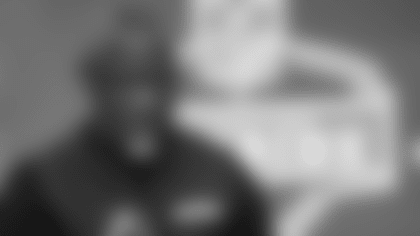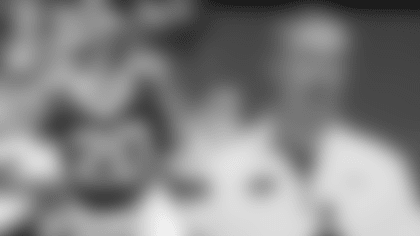Transcript of head coach Eric Mangini's news conference with the New York Jets media before Monday's practice:
We have a group of roster moves that we made. We released the following players: Darrell Adams, Tim Dwight, Zarnell Fitch, Tony Hollings, Rayshaun Kizer, Dante Ridgeway, Nick Smith and Juan Wong. This will get us down to the required number of players at this point in the preseason. Obviously this is never a good part of the process, but it's part of the process. It's always difficult and I can't thank them enough for what they did for the organization, their hard work, and I wish them all well.
In terms of the game, obviously there were a lot of things we need to improve and that's what we'll do this week. In talking to the team and going through some of the corrections this morning, one of the things that was important for them to understand is that in as many areas as we could have improved in the first half, the score was 12-6 and that's where we were. Just like in any game, there's going to be times where it's not going the way you would like it to go. You go into the locker room, make adjustments, regroup and come out and play the second half and what counts is the final score. I was pleased with the way we came out and played the second half. It's so important to reiterate that adversity is going to strike every single game. We saw it last year, second or third play of the Minnesota game, they get a strip-sack fumble, they come back and score a touchdown. It's not just about the adversity. It's how you handle the adversity and how you respond which is important.
This week, we have a short week, a couple of days to really get all of our preparation in for the Eagles game and this week is important for two reasons. One is we face Philadelphia the sixth week of the regular season. This gives us an opportunity to study them and install a lot of the information. Some of the things we install we won't use, but you can put that information in the bank so when you do play them [in the regular season], you have a head start on that week's work and an understanding of that opponent more deeply, just like we did with the Giants. Also, we have a short week during the regular season, so this gives us operationally a chance to go through that, look at the things we like here in terms of the approach, then modify it when we face that week during the regular season.
On the difference between Chad Pennington and Kellen Clemens leading the offense …
The one thing we look at is the group performance. One person cannot dictate how the group performs. There are a lot of plays where if, as a unit, they had performed better, the opportunities to complete the ball down the field would have been better and the running game would have been more effective. So it's really more of a whole group total approach than of one person versus another person.
On what he looks for in the non-starters this week going into the last preseason game …
That was another point we talked about in the meeting. Each day and week at the end of segments of training camp, you go through and you look at the roster and see how it's composed and do some projections in terms of how many linebackers are you going to keep, how many defensive linemen are you going to keep, and who you think, realistically at that point, could be on the roster. You have some ideas in your mind as to what the 53 is going to look like and what you anticipate the practice squad looking like.
As each week goes on, guys make a compelling case for themselves. Some guys who have made a really compelling case for themselves earlier on are now trailing off. I stressed to those guys this morning that they are not just competing with the guy in their spot. They are competing with all of those other guys that are in similar spots in the other positions. Each game and each practice is a chance for you to make your case. I've seen that so many times where a guy early in camp comes out, lights it on fire and then trails off or somebody who may have had a slow start really comes on. When you look at the full body of work, who you thought it was going to be isn't there. Sometimes those guys think that they made the team, and that's not how it works.
It's a constant audition and they are being evaluated by the position coaches. Mike Westhoff's voice is extremely important in this group. We have all of the scouts at practice, Mike Tannenbaum and Terry Bradway. So there are a lot of eyes and interaction and I'll talk to everybody in the organization. I want to know what [head trainer] John Mellody thinks about the players in the training room, Sal [Alosi]'s dealings in the weight room, Kathy Reade [in operations] on what they've been like when they are booking flights and things like that. I want to know the whole person because a lot of times when you get to the coaching level, there's some information that is not consistent with how they act in the rest of the building. It's ongoing and every interaction is extremely important.
On if he will play starters against the Eagles …
We'll look at it a little bit later. I've been a part of doing it both ways and see how practices go. In Game 4 it's more of a case-by-case basis, where you really have to see where is the guy, How much more information would you like to gather, what was the week of practice like, are there certain plays you want to get a look at against other opponents? So there's multiple things that come into play there.
On D'Brickashaw Ferguson and Jacob Bender …
I think it's an important point to make, talking about D'Brickashaw's sack. There are plays across the board, whether it was a rookie or an established vet that each guy had where they need to improve. It's really not just the one individual. Some of that stuff is a function of better communication in terms of how are we going to team up on the linebacker. The looks change a little bit. It's nickel personnel versus base personnel. This play where we had worked against base and there was a whole other part of the meeting this morning discussing that you have your plays that you practice and you practice them against certain looks. You can't guarantee that those looks are going to come up in the game. You do it based on percentages, odds and expectations. Once a different look comes up, that group needs to go and default back to the rules. So you need to know the rules on this running play and how we are going to block this it even though the look isn't the one that we saw in practice.
I understand that guys will complain sometimes how I ask a lot of questions in meetings, but you have to understand the concept of the play. What's the concept of the offensive play? Who is fitting where and why? When problems come up that you haven't dealt with, if you know conceptually what you're trying to get done, those things are much easier to solve than if you just know, power-I, block this guy for this guy. Well, this guy is not where he was supposed to be, but if you understand what you're trying to get done, you can solve all that stuff.
On what he thinks of Bender after studying film …
I thought, like the rest of the group, there were definitely things he could have done better. He's not alone. There are a lot of different age groups across that line and issues weren't unique to him.
On giving the first offense another series or two if he didn't see what he wanted vs. the Giants …
It's not just that one game. You look at it as a group thing. I remember one year we were playing Cincinnati and the first defense was horrible. They were walking up and down the field. We pulled them, I think it was six minutes in the first quarter, and they all started the second half. So the seconds played the first half and the firsts played the second half. That was really what was needed at that point because that's how the game was going.
On what jumped out at him about David Harris on video …
I like what David's doing. I know I've said this a couple different times, he was really consistent in Game 3. He does a nice job of going up and taking on the guards. He's got a good physical presence against those guys, but yet he's fluid in space, which I like. You look for that with the inside linebacker's spot to be able to have the ability to go hit the guy with some pop, power, and block out. You don't want that to be the only strength and now when you've got to go cover a guy man-to-man or drop to a deep part of the field, you can't get it done.
On what a short corner can do to when covering a tall wideout on a fade …
One of the things you've got to do there — and Aaron Glenn was really good at that — you have to be able to time up the ball at the point of the receiver going to get it because usually those guys are, in terms of vertical jump, pretty consistent. With the receiver playing the ball, he is probably not going to get up as high. Aaron was always very good in those mismatches, of timing when he went to play the ball in the receiver's pocket that he creates. If you're playing press-man with bigger receivers, usually you can get more of a jam on the line of scrimmage because there's less shake there. So you can really get a chance to have two hands on the guy's chest, and that usually helps a lot, too.
On transitioning from a 4-3 to 3-4 …
Most of the 4-3 defense is based on penetrating: "You have the A-gap, I have the B-gap, I have the C-gap and you're going to penetrate into that gap and that's your spacing." And most 4-3's come with an eight-man box, so they bring the safety down and all of the gaps are canceled out so there's someone on the A, the B, the back side of the A, the back side of the B and the safety is the player that cancels out the gap. In a two-gap defense, it gives you the ability to play more split-safety defense whether it be Cover-4 or Cover-2, because each player is responsible for two of those and you don't have to bring the safety into the box to cancel out all of the gaps across the front line.
On if, when the DEs rush upfield too much in a 3-4, it throws off the defense …
It's a totally different approach. You can't go one way or the other. For example, if you rushed up the field in the C-gap, then you're no longer playing two gaps. So you're vacating your responsibility in the B. You may have had the C handled, but you have both of those gaps. So you've got to go on, take the player on, control him and wait until the ballcarrier declares, throw him off and make the play. You're trying to build a wall across the front, set the edge on the outside as opposed to penetrate and run.
On if Tim Dwight was waived injured ...
We waived him. There are certain things that we'll do based on league requirements. This is tough no matter who it is because, obviously, it's hard to tell someone that they are not making the team. With Tim, having a relationship and knowing him for a while and the type of person he is, the character he has, it's always that much more difficult.
On if waiving Dwight means he is comfortable with the younger wide receivers …
I think the receiver group as a whole has done a really good job. I've been pleased with the versatility. I've been pleased with the approach. I really like the chemistry those guys have as a group. I like the way that they push each other. It's a good group.














